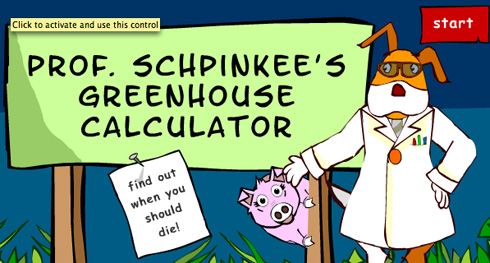
Carbon Cult sickos are under fire for an interactive website that tells children they should die because they emit CO2.
The Australian Broadcasting Corporation’s “Planet Slayer” site invites young children to take a “greenhouse gas quiz”, asking them “how big a pig are you?”. At the end of the quiz, the pig explodes, and ABC tells children at “what age you should die at so you don’t use more than your fair share of Earth’s resources!”
It’s one of a number of interactive features that “Get the dirt on greenhouse without the guilt trips. No lectures. No multinational-bashing (well, maybe a little…). Just fun and games and the answers to all your enviro-dilemas,” ABC claims.
The site is aimed at 9-year olds. However even a “virtuous” rating (e.g. not owning a car and recycling) is outweighed by eating meat, or spending an average Aussie income – with the result that many 9-year olds are being told they’ve already outstayed their environmentally-compliant stay on the planet.
“Do you think it’s appropriate that the ABC … depict people who are average Australians as massive overweight ugly pigs, oozing slime from their mouths, and then to have these pigs blow up in a mass of blood and guts?” asked Senator Mitch Fifield in the Herald-Sun.
The state-sponsored broadcaster (why is that not a surprise?) defended the morbid quiz, with ABC managing director Mark Scott insisting “the site was not designed to offend certain quarters of the community but to engage children in environmental issues.”
Which is eco-speak for frighten them witless. However, as the excellent science blog Watts Up With That points out, the site clearly breaches Australian broadcasting guidelines on “harmful or disturbing” content.
Meanwhile, the site’s designers are revelling in the controversy:
“Thank God for outraged senators – you can’t buy publicity like that,” PlanetSlayer’s “creative director” Bernie Hobbs crowed to the New York Post.
So how, according to ABC, does one appease the vengeful Death God, Gaia?
